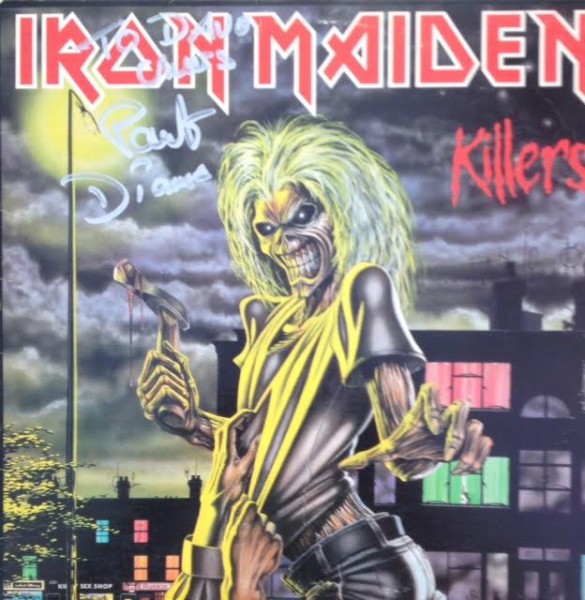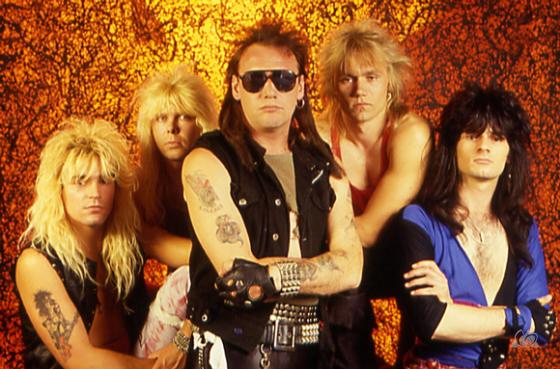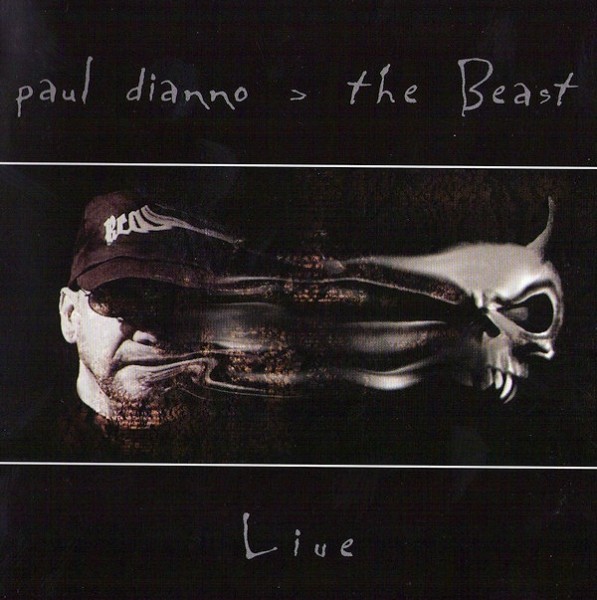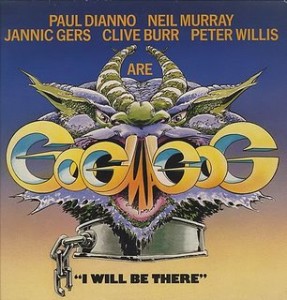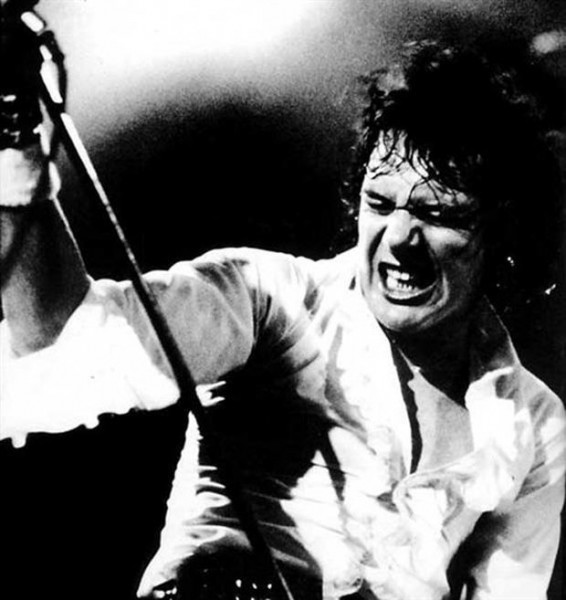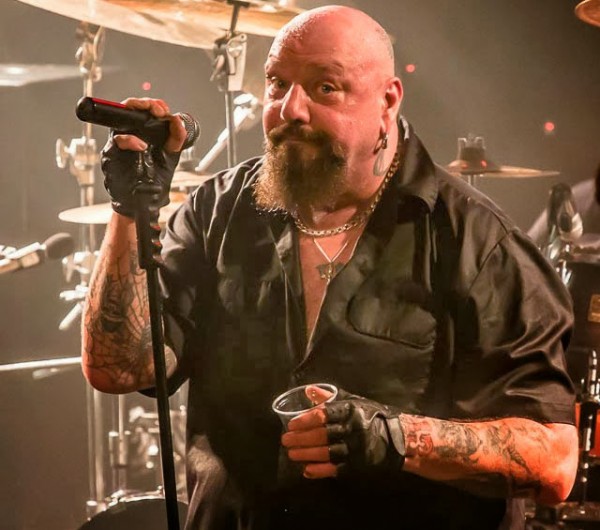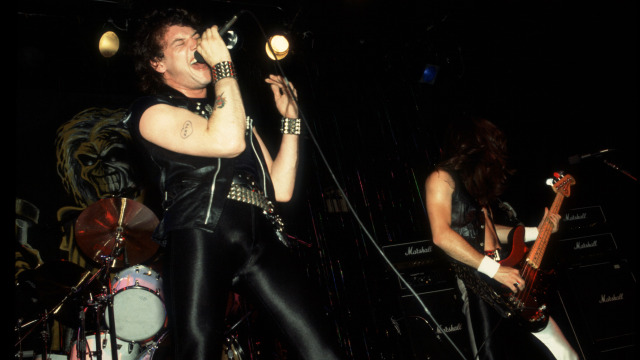
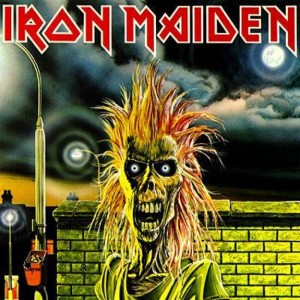
MAIDEN VOYAGE: The debut album that would help redefine heavy metal was released in 1980 and featured Maiden’s longstanding mascot, “Eddie,” on the cover. Artwork by Derek Riggs.
By Metal Dave
(originally published circa 2001 on KNAC.com with 2015 apologies for the painfully long intro!)
Iron Maiden soared to astronomical worldwide acclaim with vocalist Bruce Dickinson at the helm, but ask the members of Anthrax, Pantera or any of the corpse-grinding death metal merchants to name a favorite Maiden platter and the scales will likely tip in favor of original vocalist, Paul Di’Anno. It’s a tough call and one that’s not worth arguing since both singers are rightfully praised for their contributions to the metal genre.
Dickinson’s 1982 Maiden debut, “The Number of the Beast” is easily one of the top five best metal albums EVER. Then again, it was Di’Anno’s “Iron Maiden” and “Killers” that laid the groundwork for the articulate, galloping tales of murder and mayhem that would become Maiden’s legacy.
A legacy was a long shot when Di’Anno and his Maiden mates issued “Iron Maiden.” In 1980, when synthesizers and skinny neck ties were the good-timing, artificial flavor of the times, Maiden was the downpour of lickety-split guitar solos, foreboding lyrics and bullet belts that cast a black cloud over the new wave parade. If the screaming corpse on the album cover didn’t have the androgynous disco ducks running for cover, songs like “Prowler,” “Transylvania,” “Phantom of the Opera” and “Iron Maiden” came down like ominous orders from Black Sabbath to bring back the head of Adam Ant.
By the time Maiden released its second album, “Killers,” in 1981, Di’Anno was making a name for himself as a heavy metal hellion with a punk-rock pedigree. He could drink you under the table, his hair was terminally disheveled, he was tattooed and decked in studs, and his gruff-and-tumble vocals earned him the distinction as the New Wave of British Heavy Metal’s leather-clad doomsayer.
The band’s growing success came with a price, however, and Di’Anno soon bowed out to save himself from the rigors of the road and a growing dissatisfaction with Maiden’s musical direction.
With the excellent live EP, “Maiden Japan,” serving as his swan song, Di’Anno hung up his leather jacket and briefly disappeared from the spotlight. Replaced by former Samson screamer Dickinson, Maiden released a steady stream of definitive metal albums and went on to establish itself as one of the most influential and superior metal bands of all time.
Bruised, but not broken, Di’Anno resurfaced with varying degrees of success as front man for the bands Battlezone, Killers and Di’Anno. A bona fide metal icon in Europe and other overseas locales, Di’Anno always commanded respect whenever and wherever he took the stage. America wasn’t as receptive, however, and Di’Anno was relegated to cult-hero status, but a hero nonetheless.
With the recent release of “Paul Di’Anno – The Beast Live,” the singer re-introduces himself as one of heavy metal’s most important mouthpieces. The album is a collection of essential Di’Anno material recorded live over the past decade and beyond with various lineups as backing bands. Even if you own all of Di’Anno’s Maiden material, this 10-track live album is a worthy addition to your collection.
With Di’Anno back and running free, publicist Carol Kaye graciously went above and beyond the call of duty to coordinate the following interview from the UK to Austin, Texas.
KNAC.COM: Is the new live album a reaction to fan demand or is it more of a personal closure to the final chapter in your legacy with Maiden?
PAUL: It’s a bit of both, really. Over the years, we’d record the shows most night and we’d be doing different Maiden songs in the set. I did it because I enjoyed playing those songs and because the fans would probably be fed up with me if I didn’t (laughs). Everywhere in the world, I would see these bootlegs, so (producer) Lea (Hart) said let’s put together the live stuff. What we’ve agreed to do with Killers is promote this album for a year on tour. I know a lot of people are going to say, “Ah – cash in!” but that’s not it at all. I sold my material back to Maiden, because I didn’t see the point in keeping it to be honest. Hopefully, I’ll make (Maiden founder/bassist) Steve (Harris) even richer (laughs).
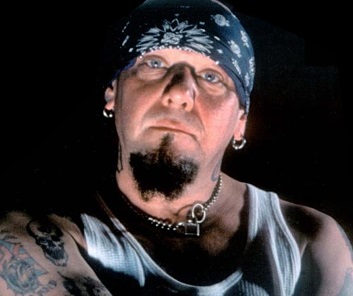
GIMME SANCTUARY: By his own admission, Di’Anno’s career has no doubt been hindered by run-ins with the law.
You’ve had trouble getting to America in recent years to tour. Are those problems resolved? Can we expect to see you touring America in support of “The Beast Live”?
Yeah, I had problems last year with my solo stuff. My work permit was not in order. I was really stupid about six years ago (in an episode) with my ex-wife when I was living in L.A. I went to jail and so when it came time to tour, the American embassy in England came back and said, “Think again!” I had to cancel the whole tour. This time, we’re going to do it properly and legally. I’m going to see a lawyer. It’ll probably be next year or early spring (before the tour lands in America), because we’ve got a lot of festivals in Europe. Plus, I’m writing a new Killers album right now, which is the first one in six years.
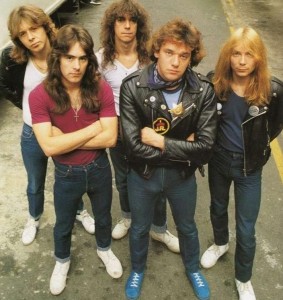
BUILDING THE BEAST: Maiden’s debut-album lineup featuring Clive Burr, Steve Harris, Dennis Stratton, Di’Anno and Dave Murray.
How has your post-Maiden success overseas compared to that in America?
When the first Killers album came out, we did very well. The second album wasn’t as well received in Europe. I think it was a little too heavy for them, bless their hearts. At the end of the day, you write what you write. If you change it for others, you’re going to be unhappy. Plus, I’ve had some bad record labels and bad management. I still don’t think I’m getting half the royalties I should be getting.
In a recent interview with Saxon singer Biff Byford, I asked him if the New Wave of British Heavy Metal movement had the unity the label might imply or if it was actually much more competitive. He said it was a little of both. What’s your take on the NWOBHM?
I’d have to agree with that, really. We stopped at a lot of motorway cafes with Saxon and Motorhead over the years. With bands like Maiden, Saxon, Motorhead and Def Leppard, it was more of a friendly thing. With some other bands, it was all sour grapes. They’d say, “Oh, we can do better than that” and we’d say, “Alright then, do it!”
What’s the story about your involvement in the NWOBHM supergroup, Gogmagog?
Oh, it was sick, really! This guy came up with the idea of David Coverdale, John Entwistle, Cozy Powell and … I can’t remember the guitarists. He wanted to put together this supergroup. Then I took Coverdale’s place and Clive Burr took Cozy’s place, and we had Janick Gers in there with Pete Willis from Def Leppard and Neil Murray on bass in the end. It sounded good on paper. It could have been fantastic, but the guy wouldn’t let us write our own songs. The songs (the previous lineup) came up with were godawful. I wrote better songs when I was 11 years old. In the end, we just let it go. I don’t ever want to do anything like that again. The guy was an entrepreneur named Jonathan King who was also a pop star in the ‘60s. He wrote that godawful song “Una Paloma Blanca.” The record companies started paying him millions of dollars just to go away. Now he’s up on sex charges here in England for messing around with little boys. I’m glad nothing ever came of that and if I see him, I’ll kill him.
Why did you leave Iron Maiden in the first place?
It’s a two-way thing, really. The first Maiden album, I absolutely loved. The second one, I was a bit unhappy with. It didn’t have the same energy and the songs were getting a bit longer. I couldn’t give 1,000 percent. Instead of letting myself and the fans down, I decided to walk away.
There had to be some regrets once you saw Maiden achieve massive success right after your departure.
Not really. We (sold) 18 million records when I was with the band. Can you put a price on happiness and peace of mind? You can’t. Driving yourself crazy for a few extra dollars in the bank account just isn’t worth it.
Has Maiden tarnished its legacy with the coming and going of singers, adding a third guitarist and altering the sound of the music? Should they have hung it up years ago or do you still feel they are a viable band?
With Bruce back in, I think they’re viable again. No disrespect to Blaze (Bayley), but I don’t think he was right for Maiden. I think if he’s honest, he’d say the same thing. Some of the albums started to sound the same. I don’t think Maiden’s written a great album in years. I think the first three – two with me and one with Bruce – are the definitive Maiden albums … and “Stranger in a Strange Land” (sic “Somewhere in Time”) was great. They’re coming back, though.
Were you ever asked to rejoin Maiden when the band was in need of a singer?
No. There were massive rumors going around. At the time I was still living in L.A. and had fired my manager so I wasn’t aware of (the opening for a vocalist). I’m walking around L.A. and people are coming up to me going, “Congratulations, I hear you’re back in Maiden.” I was, like, “Huh?” If I was asked, I would probably still say no, because I don’t think anything’s changed.
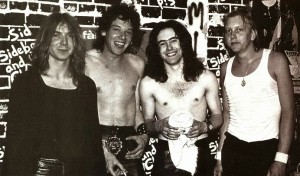
THE YOUNG ONES: An early lineup of Maiden featuring Dave Murray, Di’Anno, Steve Harris and then-drummer Doug Sampson.
Meaning what? Did you not get along with some of the band members?
No, no. Nothing like that. It’s just that they haven’t written anything I want to sing and vice-versa. I came from a punk, hardcore background before Maiden and I still tend to dabble in that and be as heavy as possible. They’re still into that mid-tempo, galloping sort of thing.
As a legend in traditional metal circles, what do you think of what’s being called heavy metal today?
What IS heavy metal today? To me, the last great heavy metal bands were Metallica, Sepultura and Pantera. I haven’t seen much since then. Limp Bizkit? I like their stuff, but it’s not really metal, is it? It’s more hip-hop, I think.
How do you feel about the whole death metal scene that is obviously very influenced by early Maiden?
That’s an interesting one, because I don’t really listen to a lot of that stuff. I think the band Cradle of Filth is fantastic. We played with them at a festival a few years ago and they were right down in front headbanging. An old friend of mine, King Diamond, is still out there, but I really don’t keep up with all that.
Well, obviously, Maiden, you know? I was 16-years-old and it was, like, “Wow! This is unbelievable!” But this period in my life right now is absolutely brilliant. I know how to handle things better. With Maiden, I had too much too soon. It doesn’t get much better than this. Now, I’m working all the time. And if I’m not, I’ve got this little punk band I play in for charity.
Tell me about the punk band.
Oh, it’s sick (laughs)! It’s called the Almighty Inbreds and we try to be as offensive as possible. We do some covers by the Ramones, the Pistols, the Damned. We just do it to make money for Bosnia and children in need. We’ve got a record that’s going to be released in a couple months on a punk label out of Toronto called Muck Records. All the proceeds are going to charity.
Is it a bittersweet accolade to be remembered as the sentimental and influential fan favorite at the expense of the commercial glory bestowed upon Bruce and the post-Di’Anno versions of Maiden?
It’s really nice when your peers like Metallica and Pantera go, “Yeah, I grew up on that stuff.” Financially, I’ve got enough money. If I had any more, I’d go back to the drugs and alcohol, which is something I’ve stayed away from for years. As long as my kids are eating and there’s a roof over our heads, I’m fine. I’d rather be remembered as an influence. I ain’t complaining.
BELOW: Di’Anno fronting Iron Maiden in 1981. Metal rarely gets better than this.

